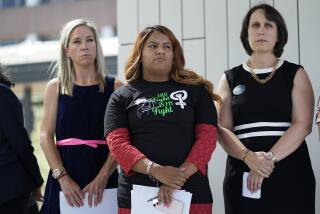MoveOn redefines party politics
- Share via
Mad as hell isn’t necessarily the best mood to take to a party, but when the event is political and everyone there feels the same way, a sense of community can carry the occasion.
In an effort to get as many people as possible to see filmmaker Robert Greenwald’s anti-administration documentary, “Uncovered: The Whole Truth About the Iraq War,” a 1.4-million-member Internet-based liberal advocacy group organized simultaneous house parties throughout the country.
MoveOn encouraged its supporters to buy copies of the film on DVD or video, then welcome strangers into their homes for a viewing. By Sunday afternoon, when the parties began, more than 2,200 hosts had volunteered by posting their addresses on the Web site. Anyone interested could RSVP and attend free of charge.
The separate parties would be united in a mass conference call to celebrate the grass-roots effort and hear Greenwald answer questions about the film.
Ann Smith, who owns the New School of Cooking in Culver City, opened her Faircrest Heights home to 40 guests at sunset. She’d joined MoveOn last March, after she heard commentator and former gubernatorial candidate Arianna Huffington and former “Politically Incorrect” host Bill Maher recommend the group. “When MoveOn decided to organize the house parties, I thought, ‘Why not?’ I made a promise to myself to work politically this year, because this is the year it really counts,” she said.
A check of the more than 40 Los Angeles-area parties on the MoveOn Web site Friday showed that nearly all were at capacity. Smith’s guest list was filled in two days.
About one third of the guests were friends of Smith’s. The rest signed up online, choosing her party because it was geographically desirable. Leslie Robin, who lives nearby, said, “I like being among neighbors. This is more personal than it would be in a large lecture hall.”
Smith’s party was similar to the other local gatherings, except for the presence of Greenwald and his co-producer, Kate McArdle.
The evening was more like an adult education class than a social occasion. Guests wearing first-name-only identification tags initially hovered around a table of food. Liz Biber, a friend and student of Smith’s, made some of the hors d’oeuvres, including caramelized onion tartlets that could tempt an anarchist. Biber brought her brother, an architect visiting from New York. “I haven’t seen the film, but I’m sure I’m politically in line with it,” Jim Biber said.
The group fell silent when a speakerphone was set up on the dining room table and the conference call was broadcast before the film was screened. The disembodied voices of MoveOn staffers welcomed the partygoers. Campaign director Eli Pariser urged people to “show the film to your friends and to your enemies.” MoveOn estimated that 50,000 people watched the film in homes from Fairbanks, Alaska, to Miami.
While Smith’s guests listened in the dining room, Greenwald, in another room, took the phone and answered questions that had been submitted by e-mail from around the country. Then Smith’s guests, who ranged in age from late 20s to 70s, filled chairs set up in her darkened living room and watched the 56-minute documentary on her television. Half a dozen people who couldn’t find seats were invited to view a second copy on her laptop in another room.
For the most part, they were a rapt and polite audience. Geoffrey Pomeroy, an actor and musician who came with a friend, muttered an unprintable name for the president under his breath early on, but civility reigned. In the film, one of the former government employees voicing his opposition to the administration’s conduct quoted Mark Twain’s definition of patriotism: “Supporting your country all the time, and the government when it deserves it,” a remark that elicited a murmur of appreciation.
There’s always a kitchen party. In this case, it consisted of five people who’d already seen the film and preferred to talk about its message with one another while it screened. Their discussion gradually moved from criticism of the war to their antagonism toward the religious right. After the screening, Greenwald answered questions from the crowd and told them how making the film made him realize how effectively the administration exploited people’s fear of nuclear weapons. “Their message reaches you on a very emotional level,” he said.
Missing from the evening were opposing voices. “There’s an element of preaching to the choir here,” Smith said. “But the choir needs to sing a little louder. After seeing the film, a lot of people felt that they had a responsibility to get more involved. I’ve never had a party where I liked so many people! About 15 people stayed for about an hour and half after the screening, and they were going on and on about how great it was that this community of like-minded people had come together.”
More to Read
Get the L.A. Times Politics newsletter
Deeply reported insights into legislation, politics and policy from Sacramento, Washington and beyond. In your inbox twice per week.
You may occasionally receive promotional content from the Los Angeles Times.










